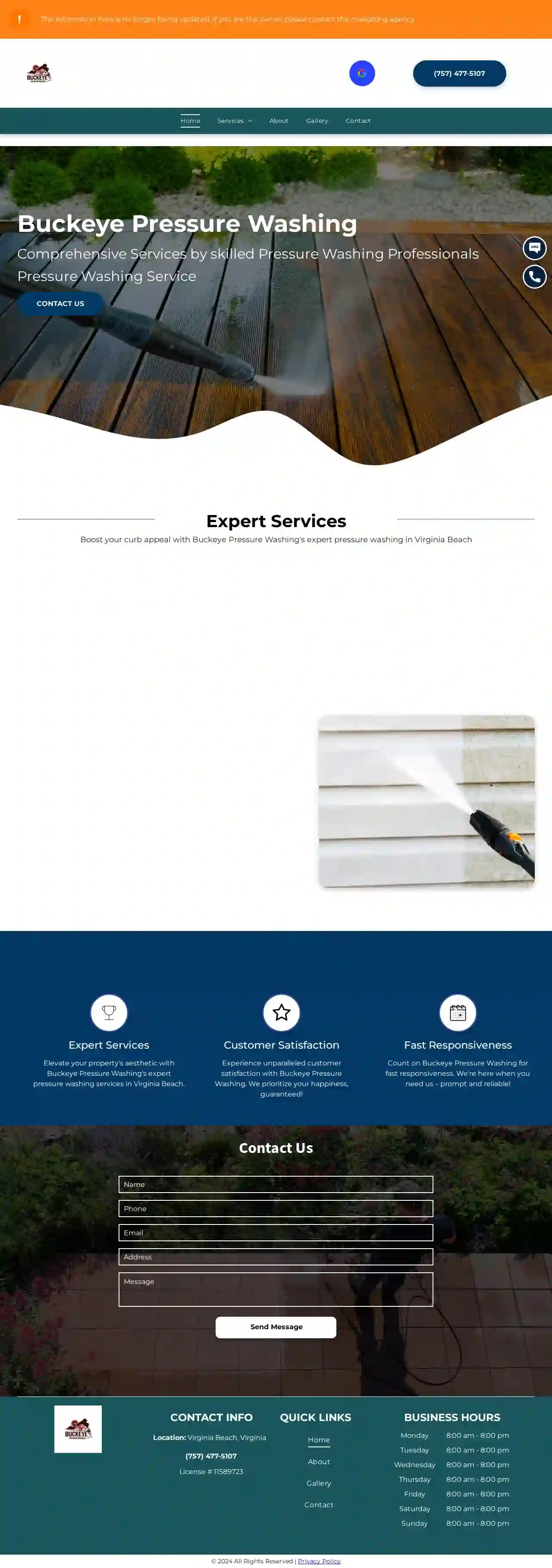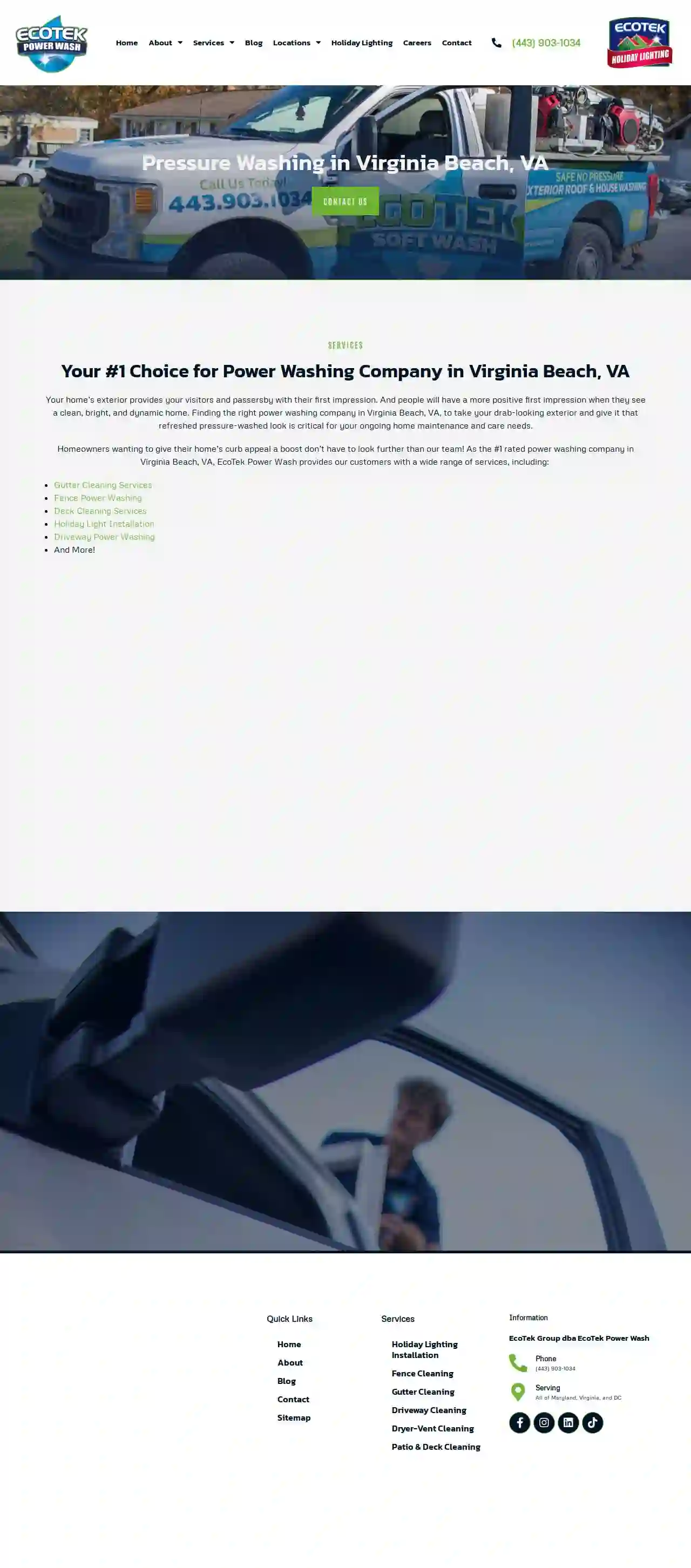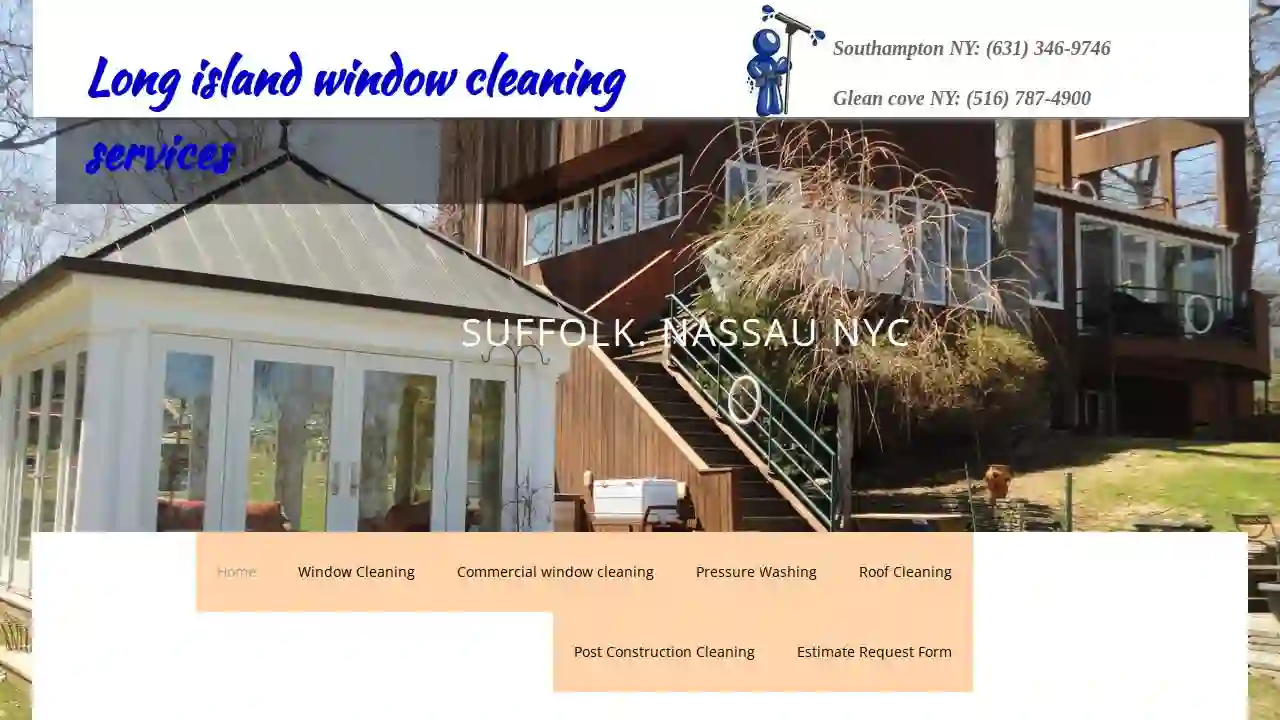Window Cleaning Pantops
Find Professional Window Cleaning in Pantops
Receive multiple Commercial Window Cleaning quotes for your project today! Compare profiles, reviews, accreditations, portfolio, etc... and choose the best offer.

Good Lookin Pressure & Window Washing
56 reviews4863 Baxter Road, STE 105, 4863 Baxter Road STE 105, Virginia Beach, 23462, USWe are a premium, fully-insured window cleaning company dedicated to 100% top-notch services in Virginia Beach, VA and surrounding cities. We provide not only the best window cleaning services but also excellent and professional pressure washing services such as commercial pressure washing, graffiti removal, concrete cleaning, roof cleaning, and house washing. Customer satisfaction is our number one priority. We strive to ensure that the entire process, from the first call to the final bill, is as painless and easy as possible for our customers. As your premier window cleaning company here in Virginia Beach, we guarantee your satisfaction, whether your property is commercial or residential. Our prices are fair and affordable, and we make sure we offer the highest quality services in order to satisfy the customers, whether we are providing window cleaning or other pressure washing services. We gladly provide our regular clients with the best offers and discounts. We are happy that our clients recommend our services and experts to their partners, friends, and neighbors. Our regular clients get regular discounts on all our services. We can discuss special offers with our regular corporate clients! Contact our manager for detailed information, and we will gladly find the perfect solution for you. We use top-of-the-line equipment and combine that with our incredible depth of knowledge about pressure washing to deliver the best window cleaning in Virginia Beach and surrounding cities. Some people ask us why they should hire a professional window cleaning company instead of trying to clean their windows themselves. The obvious reasons to get your windows professionally cleaned are a clear view, heat efficiency, and a professional image. However, avoiding glass degradation is the most important reason to hire window cleaning services on a regular basis. Certain contaminants such as oxidation, hard minerals, acid rain, and sea spray can damage windows permanently. Let us save you time and future hassle by cleaning your home or commercial building before it is too late.
- Services
- Why Us?
- Our Team
- Testimonials
- Gallery
Get Quote
Buckeye Pressure Washing
Virginia Beach, USAt Buckeye Pressure Washing in Virginia Beach, VA, we know the value of a clean, inviting exterior. Our family-owned and veteran-led team brings five years of dedicated pressure washing experience to residential and commercial clients throughout the Virginia Beach area. We're committed to revitalizing your property with care and professionalism.
- Services
- Why Us?
- Accreditations
- Gallery
Get Quote
Exterior Cleaning Solutions
51 reviewsSuffolk, USExterior Cleaning Solutions is a property owner’s best friend. You shouldn't trust your property’s appearance to just anyone. Whether you own a home or operate a business, you know that keeping the exterior of your property clean will boost your property value, create that first impression you need if you’re showing your house or trying to attract customers, and extend the life of your building. Exterior cleaning is no amateur do-it-yourself project. You need professionals who can restore the components of your home or business to their best condition. You need Exterior Cleaning Solutions. We use power washing and soft washing techniques on all types of siding or exterior surfaces. From vinyl to wood, to fiber cement siding to stucco, we’ll get rid of the contaminants that can accumulate on the exterior of your home. The same holds true for our roof cleaning surface. Exterior Cleaning Solutions will reach the hard to reach places on your roof whether it’s made of asphalt, cedar, or slate. And Exterior Cleaning Solutions is certified by the Roof Cleaning Institute of America (RCIA). We will clean your windows in both the interior and exterior of your home as well. We’re not just all about exteriors either. We will clean your sidewalk paths, driveways as well as your pavers to make the entrance to your home look spectacular. Exterior Cleaning Solutions also provides cleaning services for all types of fences. We’ll even clean and restore your gutters to make sure that ice dams won’t form and rainwater won’t damage your home. Exterior Cleaning Solutions will also clean playground equipment. If you run a commercial establishment, Exterior Cleaning Solutions offers many of the same services including exterior washing of your building, windows, and sidewalk cleaning. We also provide services that are specific to businesses such as gum removal. We’ll put in the work to take care of difficult to clean areas. If you have a dumpster pad or if you run a restaurant or other business that has a drive-thru pad, we’ll scrub it down and get rid of contaminants. If you run a gas station or repair shop, we know it’s difficult to clean the grounds, the exterior surfaces, and the islands on your property. Exterior Cleaning Solutions will also take care of specialty cleaning jobs like cleaning efflorescence and calcium deposits. We’re also the experts at rust removal, dryer vent cleaning, shrink-wrapping, and gutter restoration. Regular cleaning and maintenance will enhance your property’s curb appeal and improve the durability of things like your sidewalks and your exterior surfaces. If you want your business to have a professional look or if you want your home to retain its beauty, you need to hire the experts at Exterior Cleaning Solutions. We’ll make everything look shiny and new, and we’ll always do the job professionally.
- Services
- Why Us?
- Accreditations
- Gallery
Get Quote
Crystal Clear Window Cleaning
4.7151 reviewsSuffolk, USCrystal Clear Window Cleaning is proud to be one of the largest window cleaning companies in the United States. We have operated a simple, honest, family owned business for over 25 years, thanks to our wonderful staff and amazing clientele. Not only do we pride ourselves in delivering a great customer experience, but we value professionalism and integrity in all aspects of our work. I personally guarantee that you'll see the Crystal Clear difference.
- Services
- Why Us?
- Accreditations
- Our Team
- Testimonials
- Gallery
Get Quote
Clear Window Cleaner & Power Wash Cleaning Services
58 reviewsLong Island, 11703, USClear Window Cleaner & Power Wash Cleaning Services is a family owned business, customers satisfaction is our #1 priority. We offer free estimates, window screen repair, provide discounts and work around customers schedules and needs. What ever your project and budget Clear Window Cleaning & Power Wash is ready to help cleaning Windows, Skylights, Mirrors, Chandeliers, Roofs, Gutters, Siddings, Patios, Decks, Fences, Side walks, Driveways, Gazebos, Tennis Courts and much more !!
- Services
- Why Us?
- Gallery
Get Quote
Fish Window Cleaning
4.812 reviews5541 Parliament Dr #104, Virginia Beach, 23462, USWelcome to Fish Window Cleaning of Virginia Beach, VA! We are your local window cleaning and awning cleaning company servicing Virginia Beach, Chesapeake, Tidewater, Norfolk, Suffolk, and Franklin, Virginia. We provide these services to commercial and residential customers: Window Cleaning, Awning Cleaning, Soft Washing, Pressure Washing, Construction Clean Up, Gutter Cleaning. We were happy to clean the homes of four amazing women affected by breast cancer for free in honor of Breast Cancer Awareness Month. We are participants of FISH Feeds, a charitable project to feed the hungry within our own community. We also provide cleaning of all types of windows and awnings, even the hard to reach ones of your home. We work quietly and quickly as we move from room to room to cause the least disruption. We even introduce our team to you before we start cleaning so you know exactly who will be giving your windows and awnings a spectacular shine.
- Services
- Why Us?
- Our Team
- Testimonials
- Gallery
Get Quote
Village Window Cleaning
525 reviewsSuffolk, USLet Us Do The Dirty Work Quality Window Cleaning& Power Washing on Long Island Long Island Village Window Cleaning & Power Washing serves commercial and residential properties to save you time, money, energy and stress. Basically, our mission is to do the stressful and time-consuming work to upgrade your space, all so you don't have to. And we do everything with extraordinary attention to detail and superior craftsmanship, with a team of experienced, licensed, insured and dedicated professionals. Specializing in Both Commercial & Residential Properties Window Cleaning Whether it's your home or office, our team can transform your windows with brilliant, sparkling results at fair and affordable rates. Power Washing With a proven combination of powerful equipment and cleaning solutions, we're dedicated to providing your outdoor space with the look and feel of a true, brilliant clean. Gutter Cleaning Our gutter cleaning services will save you time, money and stress. We'll spare you from the hazards of cleaning your own gutters while delivering incomparable results. Wide Range of Services Roof Cleaning/Soft Washing • House Washing • Hard Water Stain Removal • Mirrors/Skylights • Glass Restoration • Stucco Cleaning • Screen Repair • Gum Removal • Graffiti Removal • Shower Doors Power Washing of All Exterior Surfaces
- Services
- Why Us?
- Gallery
Get Quote
Fish Window Cleaning
4.526 reviews9479 Silver King Court Suite A, Fairfax City, 22031, USOwner: Chris Johnson Serving: Fairfax, VA, Fairfax City, Falls Church, Springfield, Vienna, McLean, Annandale, Oakton, Tysons Corner, Chantilly, Herndon, Reston, Burke, and Alexandria. We're located at: 9479 Silver King Court Suite A, Fairfax City VA 22031 (571) 732-3470 Welcome to Fish Window Cleaning Fairfax, VA! We are your local window cleaning company serving Fairfax, Fairfax City, Falls Church, Springfield, Vienna, McLean, Annandale, Oakton, Tysons Corner, Chantilly, Herndon, Reston, Burke, and Alexandria. We provide free estimates! Contact us today: (571) 732-3470 Your Home We know your home is important to you and it's important to us too! That's why we work hard to protect every aspect of your home as we clean. We wear clean shoe covers while in your home and use cloth pads under the windows to protect your flooring. We're extremely careful when cleaning your chandelier too. Our team is licensed, bonded, and insured so you have nothing to worry about. We even use environmentally-friendly cleaning products so you don't have to deal with harsh fumes. Learn more about our services for your home. "Fish Window Cleaning is professional, friendly, courteous and does an excellent job on cleaning our windows." Your Business Regardless of what type of business you own, we can help give your customers a great impression. We can remove all of the fingerprints and streaks from your windows and glass doors. We can make your mirrors spotless. We can even make your chandeliers sparkle. We understand how important it is to work with our customers according to their specific needs, schedule, and budget. That's why all of our cleaning programs are 100% customizable. Learn more about our services for your business. "I would like to take this opportunity to thank your local staff in my area for their amazing professionalism, the quality of work, and customer service that they provide to us!" Our services include: Interior & Exterior Window Cleaning Chandelier Cleaning Mirror Cleaning Skylight Cleaning High Dusting Ceiling Fan Cleaning Hard Water Stain Removal Construction Clean-Up Outdoor Light Fixture Cleaning Gutter Cleaning We accept cash, checks, and all major credit cards for your convenience! We serve the following zip codes: 22180, 22102, 22181, 22124, 22182, 22032, 22031, 22033, 22030, 20191, 20190, 20171, 22101, 20152, 20151, 22003, 22015, 22027, 22037, 22041, 22042, 22043, 22044, 22046, 22150, 22151, 22152, 22315
- Services
- Why Us?
- Our Team
- Testimonials
- Gallery
Get Quote
LBL Pressure Washing and House Wash
N/A, USEcoTek Power Wash is a leading power washing company serving Virginia Beach, VA, and surrounding areas. We specialize in providing high-quality, eco-friendly pressure washing services for both residential and commercial properties. Our team of experienced professionals utilizes soft washing techniques to effectively remove dirt, grime, and mildew without damaging your surfaces. We offer a wide range of services, including roof cleaning, gutter cleaning, fence cleaning, driveway cleaning, dryer-vent cleaning, patio and deck cleaning, and holiday lighting installation. We are committed to providing our customers with exceptional service, competitive pricing, and a spotless finish.
- Services
- Why Us?
- Accreditations
- Our Team
- Testimonials
- Gallery
Get Quote
Long Island window cleaning services
58 reviewsRoute 454, Hauppauge, 11788, USLong Island Window Cleaning Services is a professional window cleaning company serving Long Island, NY. We offer a range of services including window cleaning, high rise window cleaning, pressure washing, roof cleaning, and post construction cleaning. Our team of experienced professionals uses state-of-the-art equipment and eco-friendly cleaning solutions to ensure a spotless and streak-free finish. With over 20 years of experience, we have built a reputation for providing exceptional service and customer satisfaction. Contact us today to schedule your appointment and experience the difference for yourself.
- Services
- Why Us?
- Gallery
Get Quote
Over 60,241+ Cleaning Services on our platform
Our janitorial contractors operate in Pantops and beyond!
CleaningMatch has curated and vetted the Best Janitorial Contractors in Pantops. Find the most reliable contractor today.
Frequently Asked Questions About Window Cleaning
- Regular Cleaning: Cleaning windows more frequently helps prevent dirt and grime from building up and becoming harder to remove.
- Window Treatments: Using blinds or curtains can help reduce direct sunlight exposure, which can fade furniture and attract dust to windows.
- Landscaping: Trim trees and shrubs near windows to minimize pollen, sap, and bird droppings from accumulating on the glass.
- Air Filtration: Using air filters in your home or business can help reduce airborne dust and pollutants that can settle on windows.
- Protective Coatings: Some professional window cleaners offer protective coatings that can help repel water and dirt, keeping windows cleaner for longer.
- Temperature: Window cleaning solutions may freeze in extremely cold temperatures. Reputable window cleaners have solutions and techniques for cleaning windows in colder weather, such as using warm water or heated cleaning solutions.
- Weather Conditions: Window cleaning is best avoided during snow, ice, or strong winds. Professional window cleaners will typically reschedule appointments if the weather conditions are unsafe.
- Interior Cleaning: Interior window cleaning is generally easier to perform in the winter as the colder temperatures prevent the cleaning solution from drying too quickly and leaving streaks.
- Vinegar Solution: Mix equal parts white vinegar and water in a spray bottle. Apply to the stains, let it sit for a few minutes, then scrub with a non-abrasive sponge and rinse. Vinegar's acidity helps dissolve mineral deposits.
- Baking Soda Paste: Make a paste of baking soda and water, apply to the stains, let it dry, then scrub and rinse. Baking soda acts as a gentle abrasive to remove stains.
- Commercial Hard Water Stain Remover: Use a commercial hard water stain remover according to the product instructions. These products are often formulated with stronger cleaning agents to tackle tough stains.
- Professional Window Cleaning: For severe hard water stains or if you prefer to avoid DIY methods, hire a professional window cleaning service. They have specialized tools and solutions for removing stubborn stains.
How can I prevent my windows from getting dirty so quickly?
By taking these preventive measures, you can prolong the time between window cleanings and keep your windows looking their best.
Can window cleaning be done in the winter?
If you're considering window cleaning in the winter, consult a professional window cleaning service to discuss the best approach based on the weather conditions in your area.
Can I clean my own windows effectively?
If you choose to clean your own windows, use a good quality glass cleaner and microfiber cloths. Avoid cleaning windows in direct sunlight, as the cleaning solution can dry too quickly and leave streaks. It's also crucial to take safety precautions if you're cleaning high windows, using a stable ladder and having someone spot you.
How do I remove hard water stains from my windows?
Always test any cleaning solution on a small, inconspicuous area of the window first to ensure it doesn't damage the glass.
How can I prevent my windows from getting dirty so quickly?
- Regular Cleaning: Cleaning windows more frequently helps prevent dirt and grime from building up and becoming harder to remove.
- Window Treatments: Using blinds or curtains can help reduce direct sunlight exposure, which can fade furniture and attract dust to windows.
- Landscaping: Trim trees and shrubs near windows to minimize pollen, sap, and bird droppings from accumulating on the glass.
- Air Filtration: Using air filters in your home or business can help reduce airborne dust and pollutants that can settle on windows.
- Protective Coatings: Some professional window cleaners offer protective coatings that can help repel water and dirt, keeping windows cleaner for longer.
By taking these preventive measures, you can prolong the time between window cleanings and keep your windows looking their best.
Can window cleaning be done in the winter?
- Temperature: Window cleaning solutions may freeze in extremely cold temperatures. Reputable window cleaners have solutions and techniques for cleaning windows in colder weather, such as using warm water or heated cleaning solutions.
- Weather Conditions: Window cleaning is best avoided during snow, ice, or strong winds. Professional window cleaners will typically reschedule appointments if the weather conditions are unsafe.
- Interior Cleaning: Interior window cleaning is generally easier to perform in the winter as the colder temperatures prevent the cleaning solution from drying too quickly and leaving streaks.
If you're considering window cleaning in the winter, consult a professional window cleaning service to discuss the best approach based on the weather conditions in your area.
Can I clean my own windows effectively?
If you choose to clean your own windows, use a good quality glass cleaner and microfiber cloths. Avoid cleaning windows in direct sunlight, as the cleaning solution can dry too quickly and leave streaks. It's also crucial to take safety precautions if you're cleaning high windows, using a stable ladder and having someone spot you.
How do I remove hard water stains from my windows?
- Vinegar Solution: Mix equal parts white vinegar and water in a spray bottle. Apply to the stains, let it sit for a few minutes, then scrub with a non-abrasive sponge and rinse. Vinegar's acidity helps dissolve mineral deposits.
- Baking Soda Paste: Make a paste of baking soda and water, apply to the stains, let it dry, then scrub and rinse. Baking soda acts as a gentle abrasive to remove stains.
- Commercial Hard Water Stain Remover: Use a commercial hard water stain remover according to the product instructions. These products are often formulated with stronger cleaning agents to tackle tough stains.
- Professional Window Cleaning: For severe hard water stains or if you prefer to avoid DIY methods, hire a professional window cleaning service. They have specialized tools and solutions for removing stubborn stains.
Always test any cleaning solution on a small, inconspicuous area of the window first to ensure it doesn't damage the glass.